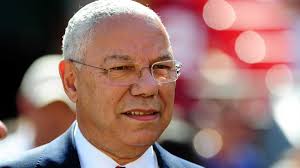|
Listening to the comments of those he worked with, we come away with a picture of Colin Powell that is very much aligned with our impressions of him, but more so now that he has died.
A general. A warfighter. A peacemaker. A diplomat. A mentor. Retired admiral James Stavridis spoke of Powell’s sense of civility and grace. Our impression of generals is too often that of bold, brash and take charge. Powell did the latter well, but he did it with a worldview shaped by his background and his service as a frontline combat soldier. No one hates war more than soldiers do, Stravridis said, quoting William Tecumseh Sherman and applying it to Powell. Having seen the cost of war up close and personally in Vietnam, he sought to avoid it. But, if it were inevitable, as seen in the first Gulf War, it must be waged vigorously and with the end in sight. Sadly, no exit strategy was in sight, as Secretary of State in 2003 made a case for war in Iraq because it was believed that Saddam Hussein possessed weapons of mass destruction, at least by the Bush administration. None were found. Powell advised President Bush against the war and later came to regret his role in it and admitted it publicly. “I’m the one who presented it on behalf of the United States to the world,” Powell told Barbara Walters on ABC News, acknowledging that his presentation “will always be a part of my record.” Working the system Fortunately, Powell contributed much more. He was a pragmatist. As a diplomat, Powell understood how governments work and how governance needed to be in place. Powell was a people person. Richard Haass, a friend of more than 40 years who first worked with him at the Pentagon, recalls seeing then Col. Powell make phone calls every morning, something Powell referred to as checking the “trap lines.” Haass explained that Powell was seeking information. Information was a currency Powell could use to understand the bigger picture. And when used appropriately could lead to greater understanding between individuals and even government agencies. “Anybody who becomes a senior officer had better have some political instincts or you’re going to get ground up,” Powell told the New York Times. “We are a political nation. It is not a dirty word.” Powell was proud of being the first Black Chairman of the Joint Chiefs of Staff and the first Black Secretary of State. Quite a leap for the son of immigrants from Jamaica. Yet, as John Meacham noted on Morning Joe, Powell said his race should not matter. What should matter is a commitment to service and the competency to do the job well. A mentor to many There is another side of Powell that amplifies his humanity. Powell was a mentor to many young women and men in the military and State Department. Stravridis recalls that when he was named the NATO Commander, the first person he went to see was Powell, who had once held that position. Stavridis told him to remember to do his job and remind himself that he was not Charlemagne. That is, keep humble and understand you can only do so much as an American general in Europe. Lloyd Austin, the current Secretary of Defense, said, “I lost a tremendous personal friend and mentor. He always made time for me, and I could always go to him with tough issues. He always had great counsel. We will certainly miss him. I feel as if I have a hole in my heart.” Colin Powell—soldier-statesman, mentor-leader—left a leadership legacy to remember. Source: Forbes, 18 Oct 2021 |
Archives
May 2022
Categories |


 RSS Feed
RSS Feed